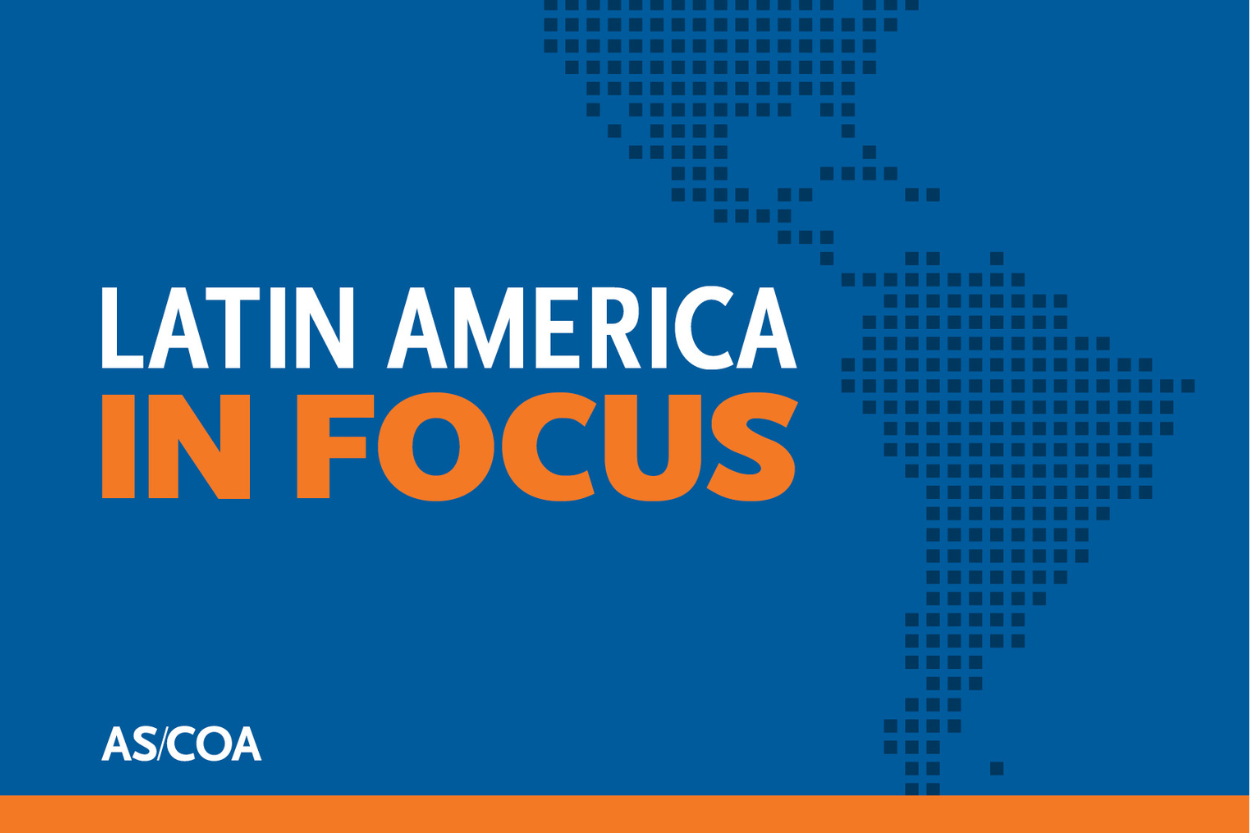Congressional Testimony: South America and the United States: How to Fix a Broken Relationship
Congressional Testimony: South America and the United States: How to Fix a Broken Relationship
COA Vice President Eric Farnsworth provided testimony to U.S. Congress, outlining areas to boost relations between the United States. He emphasized the importance of opening foreign markets, sustaining a commitment to democracy, building relations with Brazil, and promoting sustainable development.
SUBMISSION FOR THE RECORD
BEFORE THE COMMITTEE ON FOREIGN AFFAIRS
U.S. HOUSE OF REPRESENTATIVES
HEARING ON "SOUTH AMERICA AND THE UNITED STATES:
HOW TO FIX A BROKEN RELATIONSHIP"
JUNE 19, 2007
ERIC FARNSWORTH
VICE PRESIDENT
The Council applauds the Committee for its leadership on these important issues, recognizing the pivotal role that Congress plays in relations between the United States and South America. From the continued support for democracies fighting drug-fueled insurgencies and criminal activities, to expanding the effectiveness of foreign aid through such means as broadening eligibility for Millennium Challenge support, to passage of pending and future trade agreements, to addressing U.S. policies that disadvantage South America such as agriculture subsidies and the tariff on imported ethanol, Congressional action in support of strong U.S. relations with South America is critical.
There are several examples of recent success where the United States has made a positive impact, such as the biofuels agreement with Brazil and the bilateral investment treaty with Uruguay. As well, continued bi-partisan support for Plan Colombia has been a bedrock of U.S. support for friendly nations and their leaders, and trade agreements negotiated with Colombia and Peru have the potential to redefine our relations with those two nations in the same way the relationship has been developed with Chile.
These examples, in some cases brokered with leaders who view the world through a different political lens than we might view it, proves the central point: by focussing policy on practical benefits and concrete cooperation for mutual benefit rather than ideology, the United States can make progress to promote an agenda that is consistent with our own national self-interests.
Step One: Open Foreign Markets
The US-Chile FTA is a testament to the reciprocal benefits provided by freer trade. Overall, US-Chilean trade has increased 154% since entry into force of the agreement. U.S. companies have benefitted as exports to Chile have risen by $4 billion in three years, reaching $6.8 billion in 2006 from $2.8 billion in 2003. Chileans are also benefiting, as exports to the United States have increased to almost $6 billion in the same time span, reaching $9.6 billion in 2006 from $3.7 billion in 2003, while significantly lowering the unemployment rate in Chile and boosting per capita income. In all, the agreement has worked as it was designed.
Similarly, passing pending trade agreements with Colombia and Peru (and also Panama) would strengthen economic and political security in the region. Such actions would promote the same benefits that have been exhibited in the US-Chile agreement while supporting national leaders who have linked their political futures, at personal and political cost, with the United States. Additionally, these agreements would provide our friends with greater means to further stabilize their countries against narcotraffickers and others who seek to weaken democracy. The choice we face is significant and historic. Ultimately, it will be up to Congress to decide.
Next: Retain the Commitment to Democracy in the Americas
More broadly, the Council of the Americas urges Congress to renew its interest in the promotion of democracy throughout the Americas. A key aspect of this will be support for the re-authorization of Plan Colombia, which has successfully established a foundation for peace and security in a country wracked by decades of violence. Renewal of Plan Colombia would continue the bedrock U.S. commitment to Colombian security and counternarcotics efforts while incorporating increased funding for new social initiatives such as poverty reduction, education, healthcare, and other domestic reforms. To date these aspects remain underfunded due to a lack of European participation in the original Plan. Such participation should also be encouraged. At the same time, continued support for Colombia would assist an ally courageously fighting against the challenge of extra-legal activities, including guerrilla groups from the left and the right. It would also undercut the argument that is increasingly made from anti-democratic U.S. opponents and others in the region that the United States is an unreliable partner even for its closest friends.
Look to Cooperate More Closely with Brazil
As well, a key to U.S. policy in South America must be our relationship with Brazil, given its size and weight in hemispheric affairs, and its desire to play a greater role in global affairs. For example, Brazil offers a rare example of a nation that, by voluntarily giving up its nuclear program, literally turned swords into plowshares, while also re-making its space-launch program for commercial purposes. As Iran’s nuclear ambitions continue, active partnership with Brazil within the International Atomic Energy Agency, if explored fully, could directly assist the global effort to deny Iran’s ability to acquire nuclear weapons. Brazil can also serve as an example to Arab countries that favor the promotion of atomic energy for peaceful purposes. And "leftist" Brazil has itself served as a breakwater against the more populist, anti-U.S. wave sweeping much of South America.
As well, Brazil has already participated in numerous global peacekeeping operations through the United Nations and the OAS, including Haiti and much of lusophone Africa. Expanding such efforts would show acceptance of the global responsibilities expected of a global actor and should be strongly encouraged by the global community. Closer to home, even as the United States seeks to cure its "addiction to oil," Brazil is the world’s most efficient producer of ethanol, a clean, renewable alternative which could be exported more effectively to the United States were we to open our own markets. Though not a panacea, nonetheless the efficient production and distribution of such alternative fuels could contribute to an overall energy solution, which must also include conservation. As well, by promoting alternative fuels, we help address climate change while lessening the regional influence of Venezuela’s leader who is using energy resources to build an ideological movement contrary to U.S. interests.
Expand Our Tools to Promote Responsible Development
Even as U.S. assistance for South America declines, the Millennium Challenge Corporation has considerable and far-reaching potential. Currently, Paraguay is the only country to reach an agreement by signing onto an MCC threshold program. This $34 million dollar commitment from the United States is already helping Paraguay in combating corruption by strengthening the rule of law and building a more transparent business environment. Additional threshold programs are in development. Guyana was named eligible for threshold assistance in November 2005, and Peru was named eligible in November 2006. Both countries, with MCC cooperation, are drafting a development plan that must be in place before funds are made available. The only compact-eligible country in South America is Bolivia, named a candidate for MCC assistance in November 2005. However, the compact has been delayed as the current government reworks it.
The Council applauds the MCC approach which has added significantly to the foreign aid process by rewarding countries that seek to rule justly, invest in people, and allow for economic freedom. Congress could ensure that the benefits of the MCC approach could be further extended with the incorporation of sub-regions into the eligibility process; currently, only countries as a whole are eligible for MCC assistance. Impoverished regions, such as the northeast of Brazil or the south of Mexico, should be made eligible. By using indicators to score regions instead of countries as a whole, an impoverished region of a country would be able to receive assistance to make reforms and seek increased prosperity that would otherwise be denied.
Conclusion
Congress has an important and appropriate role in U.S. relations with South America. In this regard, the Council of the Americas urges the passage of the pending trade agreements, as well as a renewed commitment to Plan Colombia. We believe aid to the region, should also be increased, especially in terms of extending the reach of the Millennium Challenge Corporation and other programs which have proven successful. By working with willing partners to embrace existing opportunities in the Americas, we would benefit of the people of the United States, and the Americas as a whole.







